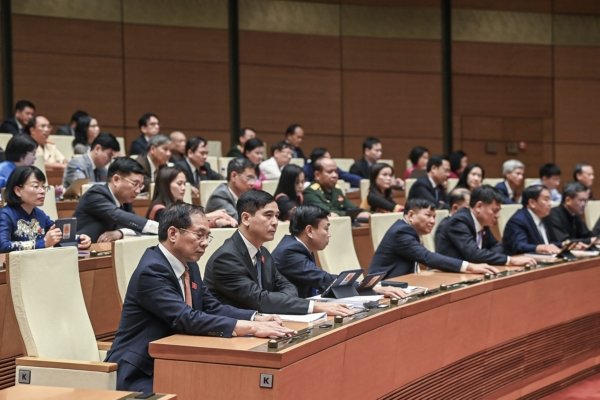Vietnam’s National Assembly elected Army General Luong Cuong as the new President yesterday (October 21). Luong Cuong’s military background, Vietnam’s return to the “Four Pillars” leadership structure, and its relationship with China have sparked attention.
Born in Phu Tho province, Vietnam, 67-year-old Luong Cuong took over from Su Lin as the new President of Vietnam on October 21, having served in the Vietnamese military for over 40 years. His military background gives the impression of being “tough” and even more conservative.
Professor Yao Yuan from St. Thomas University in the United States pointed out that Vietnam’s communism at this stage is just a facade. Since the implementation of Vietnam’s open-door policies in 1986, there has been much debate over whether Vietnam should return to communism or continue on the path of capitalism after nearly 40 years. Most Vietnamese actually support openness. So, regardless of who comes to power today, Vietnam is unlikely to return to its previous communist system.
“Actually, Vietnam is gradually moving away from China or Russia. At this stage, Vietnam belongs more to the US Indo-Pacific strategic area, showing a significant shift.”
Sun Guoxiang, an associate professor specializing in International Affairs and Business at Taiwan’s Nanhua University, believes that there is currently not enough evidence to show that Luong Cuong is a “leftist” or a representative of hardline communism. Vietnam’s leadership has gradually introduced more market-oriented reforms in economic policies in recent years and maintained open cooperation with the international community. Therefore, Luong Cuong’s role may be more focused on maintaining political stability and national security in Vietnam, rather than purely adhering to ideology.
After Su Lin was appointed President in May this year, and following the passing of former Communist Party Secretary, Nguyen Phu Trong, in July, Su Lin took on even more power as the General Secretary of the Communist Party of Vietnam. Luong Cuong was also appointed as Secretary of the Central Executive Committee of the Communist Party, and remains a member of the Central Politburo. Su Lin’s handover of the presidency is seen as a compromise in power-sharing between the two.
Sun Guoxiang said that while Luong Cuong and Su Lin come from the military and public security systems, Su Lin may place more emphasis on domestic security, but in their stance towards the West, they may hold similar views, aiming to maintain economic and political cooperation with Western countries while preserving Vietnam’s independence.
Yao Yuan believes that as Su Lin’s appointed successor, Luong Cuong’s current attitude towards the West should not differ significantly. Given Vietnam’s return to the situation of the “Four Pillars” sharing power, much of Luong Cuong’s power is divided among other positions, continuing the balancing model set by Su Lin.
The General Secretary of the Communist Party, the President, the Prime Minister, and the Chairman of the National Assembly are referred to as Vietnam’s “Four Horsemen”, also known as the “Four Pillars” of the political arena in Vietnam. After Nguyen Phu Trong’s death, Su Lin briefly held the positions of General Secretary and President. With Luong Cuong’s appointment as President, Vietnam’s leadership has returned to the “Four Horsemen”.
The President of Vietnam holds a ceremonial role as the head of state, often representing the country at high-level meetings with foreign dignitaries, but does not wield much direct power. During his 13-year tenure as General Secretary of the Communist Party, Nguyen Phu Trong became the most powerful figure in Vietnam.
Prior to his election as President, Luong Cuong visited Beijing from October 9 to 12. Now serving as the ceremonial President in diplomatic roles, his presidency raises concerns about Vietnam-China relations.
Yao Yuan believes that the Vietnamese military behind Luong Cuong is more resentful towards the Chinese Communist Party. With Vietnam currently being governed by a military system, further improvement in relations with the CCP is unlikely. “In the future, Vietnam’s relationship with China will only worsen.”
He believes that from an international perspective, due to conflicts in the South China Sea and territorial disputes, Vietnam will stand with the United States, its ally in the Indo-Pacific region, and confront China. Regardless of who the next successor is, the country is moving in that direction.
Internationally, attention is drawn to Vietnam’s leadership returning to the “Four Horsemen”, which is seen as beneficial for political stability, unlike China where Xi Jinping’s dictatorship and emphasis on party centralization continues.
Sun Guoxiang believes that Vietnam’s return to the “Four Horsemen” avoids individual autocracy, making it relatively more flexible in facing domestic and international challenges. Under Xi Jinping’s leadership, China’s excessively centralized power structure may bring potential risks, and any miscalculations could have more severe consequences on the regime.

